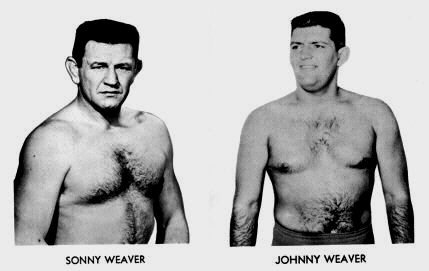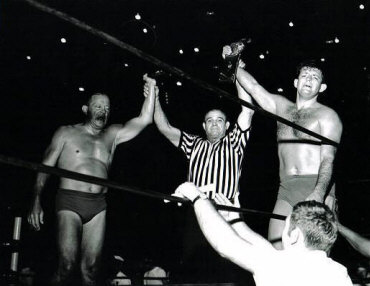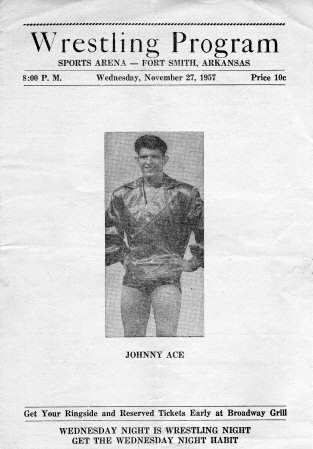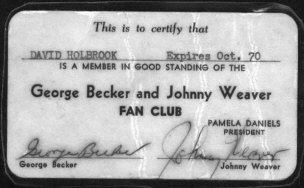|
As we began our discussion with
Johnny, he was already leafing
through his scrapbook, and had
come to a wrestling magazine
article about Johnny and Sonny,
the Weaver Brothers. I had never
known about the Weaver Brothers,
and as a big fan of other
brother combinations (both
legitimate and worked), I found
myself immediately asking about
Johnny’s wrestling brother,
Sonny Weaver.
Bourne:
Who was Sonny Weaver?
Weaver: Sonny
Myers. He just passed away this
year.
Bourne:
Were you billed as brothers?
Weaver:
There in Indianapolis we were,
yeah. I didn’t know it until he
died that he was 12 years older
than me. At one time in the
wrestling business everybody
wanted to wrestle Sonny Myers.
And then at one time here,
everybody wanted to wrestle me.
But he was my idol, and I copied
everything from him from the
atomic drop to the sleeper.

Bourne:
Oh really?
Weaver:
Yeah, well it wound up that way
because I had been in
Indianapolis when Barnett
brought me in and was going to
bring Sonny in, and at the time,
we both had flat top crew cuts
and everybody said I had a
resemblance to Sonny and we were
both really, like you saw there,
skinny then and they used to
call us “Bones”. (laughs) And
that’s how that all came about.
He was one heck of a wrestler,
boy. He was from St. Joe. That’s
really the first place I ever
went – I didn’t stay very long.
I went to Kentucky and then I
went back for a year. Missouri
Mauler, Bolo #2, Ronnie Etchison
and Sonny Myers had all come out
of St. Joe.
Bourne:
Where were you born and raised?
Weaver:
East St. Louis, Illinois.
Bourne:
How did you get into the
wrestling business and who broke
you in?
Weaver:
I went to school with a kid named
Billy
Sharbert
in high school – 10th,
11th and 12th
grade. His father Billy Sahrbert
Sr. ran wrestling, promoted
wrestling, and was an
ex-wrestler in East St. Louis at
the St. Paul Social Center on
Wednesday nights. And Billy and
I used to be what we called
“seconds” then. You would take
your wrestler to the ring, sit
on the second rope, hold the top
one open, he’d get through, and
then when they’d get the
instructions, then he’d give you
the robes and you’d carry the
robes back to the dressing
room. Plus, we were wrestling
with his dad learning the
trade. That’s how I got
started. Now, his dad knew
several promoters and the one
that took me was Gust Karras in
St. Joe and I think Billy went
to somebody in Spokane,
Washington, to start out with.
I didn’t stay in St. Joe too
long and then I went back, we
came back, and then we both went
to Bowling Green, Kentucky for
Joe Marshall, some of that stuff
is in here.
Bourne:
And what year was that?
Weaver:
Mid to late 50’s, because I had
went back to St. Joe and I went
from St. Joe to Omaha. Omaha was
real big then for Joe Dusek and
I had went up there to a TV show
in Sioux City, IA and I wrestled
Verne Gagne, who was a big star
then. It aired on TV and it so
happened Jim Barnett, the
promoter who was at that time
opening up Indianapolis, which
was brand new and had never seen
wrestling on TV, he saw me
wrestle Verne. So he contacted
St. Joe and he wanted to bring
me in to Indianapolis as a home
town boy, and that’s where he
gave me the name Johnny Weaver.
Weaver was my real last name,
but actually there was a
Buck Weaver there.
That was 1961, 1960, maybe
1959.
Bourne:
They were billing you as a home
town boy, but you kept
Indianapolis as your home town
the rest of your career?
Weaver:
Well, I stayed there for three
years. When Jim Crockett
contacted me and I said I’d come
down here, he didn’t know any
better, so he just associated me
with Indianapolis. When I got
here they started announcing me
from Indianapolis, so I just let
it go.
A
true story here: When I was
first there (in Indianapolis)
and everything was just getting
started and, my God, they had
never seen wrestling on TV
before, and when you walked down
the street after 6-8 weeks on
TV, they recognized you and it
was like – movie star idol! So,
I went to a bar one night across
from the hotel and there was a
kid in there about my age, a
little hefty, and so I
befriended him and we would go
around. So remember, on TV, I’m
billed as the hometown boy from
Indianapolis. Finally, one time
someone recognized me from TV
and said, “You’re from
Indianapolis, what high school
did you go to?” And usually I
would just put them off. But
people kept asking. So I got
that kid one night and I asked
him to name some high schools
there. Now, I’m talking 1959.
Well, he named off a few
schools, but one that stuck in
my mind was Indianapolis Tech.
So, every time people started
asking me what school I went to,
I had an answer for them, and I
said Indianapolis Tech, and
they’d just look at me
like….Come to find out, it was
an all black school! (laughs)
Bourne:
(laughing) Back in the days of
segregation, that’s right.
Weaver:
That’s true! That’s a true
story.
Bourne:
So you had to find a new high
school because the locals knew
better, huh?
Weaver:
Then when I came down here to
Crockett, they heard about me
and it was Johnny Weaver from
Indianapolis, the home town boy,
so he just put that out, you
know. So Indianapolis stuck.
Bourne:
So you spent three years with
Barnett in Indianapolis…
Weaver:
Yep – three years with Barnett.
Chappell:
What prompted Crockett to call
you, Johnny?
Weaver:
Rip Hawk.
Chappell:
Can you tell us about that?
Weaver:
At that time, Rip Hawk had been
wrestling in St. Louis. Big
card. And they also had
Evansville, Indiana TV. Well,
they moved Rip down there. Rip
got a hold of Barnett and said
he’d like to use me in
Evansville, on Wednesday nights
for a show, and on Saturday for
TV. So, I started making
Evansville, and then when Rip
left there and came down here,
and it was deader than doornails
down here for Crockett. The Von
Brauners and Bolos had killed it,
man, and Rip with that mouth and
the profile, you know, all that,
he started getting heat on him
and so when I came in, all I had
to do is kick his butt and it
was made. Everywhere just busted
open And only one problem there
was Richmond on account of
Richmond was on Friday and Rip
was always flying back to St.
Louis for a Friday night show.
Till that wore off and then
Richmond busted.
Hall:
I have lots of clippings from
your matches in Indianapolis,
from Logansport and Anderson
Indiana in 1959, matches
wrestling Angelo Poffo and
Bronco..
Weaver:
Yeah, I did that. I wrestled
Bronco a lot. I used to wrestle
him and then I would get a match
with Poffo. Cowboy Bob Ellis was
there, the Bruiser, Wilbur
Snyder, Bobby Manigoff, the
Shires came in about six months
later, and then the parade
happened after that. Everybody
that was anybody came through
there. Indianapolis was so good.
Hall:
When was your first match for
Crockett in Charlotte?
Weaver:
My first match for Crockett was
in February, 1962. First
opponent was Swede Hansen and I
didn’t know him from Adam. We
got in the ring – I think it was
a one fall, 20 minute match. We
got in the ring, locked up and I
pulled him back to the corner
and I’m going to be the, you
know, the nice guy and I said OK
man, and I laid one in.
(laughs) He popped me back, and
I mean he popped me, and then he
said, “huh-huh-huh” (laughs). I
had a cold but he knocked it out
the other side. (laughter). No
one hit harder than Swede, and
he was letting me know... that
was February of 1962..
Bourne:
And things took off for you
pretty quickly in Charlotte,
right?
Weaver:
Oh, yeah. Because once I got Rip
Hawk on TV and cleaned his
clock, it really took off. He
made me right away. There again,
it was the finishes, it was
learning. I just wiped his butt
all over WRAL TV one night, and
WRAL TV used to have a double
set of announcers and one tape
stayed there and the other tape
went to Norfolk…..
Chappell:
The northern part of the
territory
Weaver:
It went to Norfolk, Richmond – I
think what they did was took it
to Norfolk, ran a copy off of it
and it would go from Richmond
to, ah, Greenville, I guess,
Columbia, Charleston, and then
the thing about it was, as I
told Mike coming up here, that
nobody’s got any of them because
they came in a big thick case
and it was expensive and when
they made this loop and got done
in Charleston, they come back
and they taped over it for
expenses, because it was too
much, it was too expensive.
Bourne:
Which breaks our hearts as
fans. You know, all that’s gone
forever.
Weaver:
Yeah. Nobody’s got nothing.
Bourne:
So, take us through 1962 –
Weaver:
Yeah, well after Rip, of course
they made Becker take me as a
partner because of the tag team
thing, it was a tag team
territory. Becker added to it
(to my getting over) and then it
was the Bolos, and man, right
after Becker and I had been
there for like a year together,
then Haystack Calhoun came in.
And when Calhoun came in back
then, he would come in for 2-3
weeks, and then he’d go
somewhere else. But hell, they
put him with me and the Bolos, I
threw them Bolos all over the
ring for like 57 minutes of an
hour, and then the other 3
minutes was when I tagged
Calhoun and Calhoun would do his
little stuff. We didn’t beat
the Bolos, but I was beating up
on them all the time. We never
beat them – we went hour draws,
but that made me look that much
better. And so Calhoun stayed
awhile.
Then, also, I did the draws with
Dory when he won the
championship in the 60’s. I did it
with Kiniski and Thesz, too. But
see, those guys could make you
look so good, that fans would
say, “my God, he looks so good
against the world champion that
he could beat Hawk and Hansen!”
So people came and we kept them
in that mood because when I
first started with Rip and did
all that off the TV, then we’d
go to the house matches and Rip
won the match and there would be
like a screw or something, and
the houses fell right back in
half. So, me and Rip switched it
around and I would be carried
out of the ring or bloody like
that, but I had my hand in the
air and the people got back and
that’s why we did so good. When
Calhoun came in here, he had
Jack Terry with him. I don’t
know if you know that – he would
let him wrestle him. He was
Calhoun’s manager – did all,
everything. He told Calhoun, he
said “these guys have got the
right formula.” And that was the
formula. And we did it that way
for years - Mauler and Malenko,
the Andersons, Lubich and Bogni,
of course Hawk and Hansen,
Bernard and Murphy. Them guys
stayed here for years and they
were still hot. And they never
won. One time we lost the belts
to Hawk and Hansen, and hell, it
might have been two months time
to get it back. We finally got
it back in Greenville, in a cage
match and Sam Muchnick was
there, he come down to present
the winner, and Hawk and Hansen
were going to Australia. That’s
the only time we gave it up –
that one time(laughs). It was a
cage match, there was a little
hole there, and you should have
seen Sam Muchnick coming through
that little hole into that ring
to give us the belt, and when he
did get into the ring, Martinelli wanted to give us the
belt – he was the referee
(laughter) to take the heat off
of him, and they’re over there
fighting for the belt.
(laughter).

Photo by Gene Gordon © Copyright
Ditchcat Photography
Bourne:
Well, a good buddy of ours, Don
Holbrook, who lives in
Greenville and grew up there and
his mother worked at the
auditorium in the ticket office,
he said that his vivid memory
was when you all finally went
back over for those titles, the
fans lifted you up on their
shoulders and carried you out of
there…
Weaver:
Yep.
Bourne:
Now, during those mid-60’s, who
was booking the Crockett
territory?
Weaver:
Becker. I think before I came,
before he got Rip, I think Leo
Voss had it. They had it dead,
man. Between Bolos and the Von
Brauners, they had it dead.
Cline:
Leo Voss did the ring announcing
on Channel 3 before George
Harben – I never knew he booked.
Weaver:
He was booker. But they had it
dead. I mean, Jesus.
(Johnny is looking through his
scrapbook...)
Weaver:
Hey – there’s a young picture. I
was Johnny Ace. Fort Smith,
Arkansas. 1957.

Bourne:
Tell us about that – your
earlier career names.
Weaver:
That was it. I started out to
wrestle on the road as Johnny
Ace. I had a jacket that had
aces all over it (laughs), but
then Barnett finding out that my
real name was Weaver and Buck
Weaver was there, I became
Johnny Weaver.
Chappell:
0n this Johnny Ace program it
says that you used the cobra
twist to subdue most of your
opponents?
Weaver:
Yeah, that’s the stretch. Cyclone
Anoya
came up to this country
and he called it the cobra
twist, but it was the stretch.
Chappell:
And the spinning toehold, too?
That was early on, you used
that?
Weaver:
No. I did that in Indianapolis
when I first worked there. But
it’s like I said before, you’ve
got to know your opponent and
what he is capable of doing and
try to have him do something.
And some of those moves, it was
hard. Just like the atomic drop
– if you know who Ray Stevens is
who was great, or Ray Shire, you
could go for an atomic drop and
pick Stevens up and man, you
almost had to catch him he’d go
up for you so high, but then you
try to put the atomic drop on
Two Ton Harris! (laughter) And
then I started using the sleeper
and nobody could mess that up
(laughter).
Chappell:
When did the sleeper become your
finisher?
Weaver:
Sonny Myers. He got it from Mr.
Moto. But I got it from Sonny
Myers.

Bourne:
We've read that at the beginning
of your career you were also
interested in stock car racing,
that you drove stock cars. Was
that something you seriously
considered?
Weaver: I
did that before. But that was in
St. Louis and it was on one of
those little short tracks. Dirt
tracks. And we’d take off and on
the dash they had a hook come
out there and you just put it in
second gear in that hook. The
only thing was, racing was April
to October, there. Wrestling was
all year long.

Weaver:
(Looking through scrap book) Pam
Daniels….
Bourne:
Yeah – she did your fan club,
right? For you and Becker…
Weaver:
She put that out, right.
Bourne:
We were hoping you might have
one of these. The Weaver/Becker
Fan Club, and you know she also
did one for the Andersons. She
did a fan club for Ole and Gene,
too.
Weaver:
Yeah, she was a very creative
lady. She helped us.

Chappell:
How do you reconcile those two,
your club and the Anderson club?
(laughs)
Weaver:
Yeah (laughter). She was also a
very conflicted person. (Laughs)
I think she did that (Anderson
fan club) after Becker left.
Bourne:
I don’t know if you noticed or
not, on the Weaver Blog where
Don had sent us the photo that
he got and the membership card
his brother had from that fan
club.
Weaver:
Yeah, yeah, I did.
Bourne:
And he’s always wanted to try to
find Pam because he figures
she’s got a lot of memorabilia
still stuck around somewhere,
but we never have done that. I
actually sent a letter there, to
that address in Norfolk, but
never heard anything.

Hall:
Johnny, one of the questions
that comes up very often from
fans is did Johnny Weaver ever
wrestle the original Sheik, Ed
Farhat.
Weaver:
Yeah, in Indianapolis. Oh yeah.
Hall:
Can you tell us a little bit
about that?
Weaver:
Well, it was different.
(laughter). It’s an experience
to wrestle him, man. He used to
take his wife to the corner with
him and occasionally he’d jump
out of the ring when you beat
him up and he’d slap her. But he
worked in and out of
Indianapolis somewhere between
’61 and ’63. The era that I was
there, but he was really
Detroit. And if you wrestled up
in Lansing or somewhere like
that, you’d wrestle him. He
wasn’t much down in
Indianapolis.
Bourne:
I think some folks on a message
board thread said you two never
wrestled…
Hall:
…. but I have a little clipping
here where Johnny wrestled him
in ’61 in Indiana.
Weaver:
Pocomo!
Hall:
Yeah!
Weaver:
Yeah, sure did. In ’61.
|